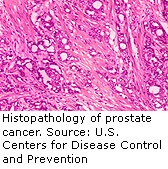
WEDNESDAY, April 14 (HealthDay News) — Preliminary research suggests that a new hormone treatment could be a weapon for doctors in the battle against a form of prostate cancer that’s resistant to surgical removal of the testicles.
Only two of the three phases of research required for new drug treatments have been completed, however. At this point, it’s not clear whether the treatment will go on to receive federal approval.
The hormone treatment, called MDV3100, is being tested as a treatment for a disease known as castration-resistant prostate cancer, according to a report on the research, published online April 14 in The Lancet.
Prostate tumors need testosterone to grow. One treatment involves castration, possibly with additional drug treatment, to combat the body’s processing of testosterone.
Though the treatment kills some cancer cells, others remain alive but dormant, the researchers explained in a news release from the journal. And these cells can re-grow and survive without as much testosterone, thus becoming castration-resistant, they said.
For their study, Dr. Howard Scher of Memorial Sloan-Kettering Cancer Center in New York City and his colleagues tested the MDV3100 hormone treatment in 140 men in the United States with castration-resistant prostate cancer. The researchers gave varying doses, from 30 to 600 milligrams a day, to the men to find the maximum tolerable dose, which they determined to be 240 milligrams.
“We recorded encouraging anti-tumor activity with MDV3100 in patients with castration-resistant prostate cancer,” both before and after chemotherapy, the researchers wrote in their report.
The researchers have begun a third phase of testing in which they will compare the hormone treatment to a placebo to see if it helps men with advanced prostate cancer live longer.
More information
For more about prostate cancer, visit the U.S. National Cancer Institute.

